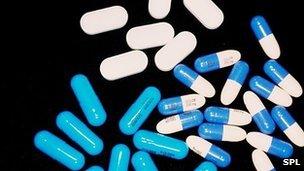NHS prescription costs to increase in England
- Published

The cost of NHS prescription charges and dental treatment will rise in April
The cost of NHS prescriptions in England will rise 25p to £7.65 from 1 April, the government has announced.
Charges for basic dental treatment will rise 50p to £17.50, with rises of up to £5 for more complex work.
The changes in charges were outlined by Health Minister Simon Burns and will be put before Parliament soon.
Doctors' leaders say the current system is unfair and needs to be reformed in England.
This latest announcement means NHS prescription charges increase again in England, while in Scotland, Wales and Northern Ireland charges have already been scrapped.
But the cost of a prescription payment certificate (PPC), which is valid for three months, will remain at £29.10 and the price of an annual PPC will be held at £104.
Mr Burns said: "PPCs offer savings for those needing four or more items in three months or 14 or more items in one year."
Charges for elastic stockings and tights, wigs and fabric supports supplied by hospitals will also be increased.
The value of vouchers for glasses for children, people on low incomes and those with complex sight problems will increase by 2.5% overall.
A BMA spokesperson said that the current system needs reforming.
"It's unfair for patients as whether you pay depends not only on what part of the UK you live in, but also on what kind of condition you have.
"The bureaucracy to administer the charging and exemption regime is also cumbersome and costly. The BMA believes it would be best to abolish prescription charges in England altogether."
Fillings to crowns
The announcement also means an increase in charges for dental treatment.
The dental charge payable for a "band 1" course of treatment - examination, diagnosis and advice, includes X-rays, a scale and polish and planning for further work if necessary - will rise 50p to £17.50.
Band 2 charges, covering fillings, root canal treatment and extractions, will rise by £1 to £48.
For band 3 work, such as crowns, dentures and bridges, the cost will increase by £5 to £209.
Mr Burns said: "Dental charges represent an important contribution to the overall cost of dental services.
"The exact amount raised will be dependent upon the level and type of primary care trusts and the proportion of charge-paying patients who attend dentists and the level of treatment they require."
- Published4 March 2011
- Published2 March 2011